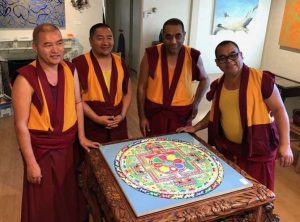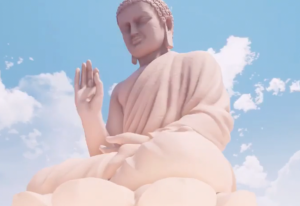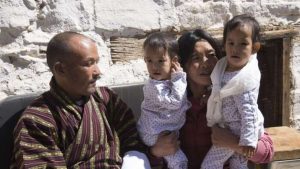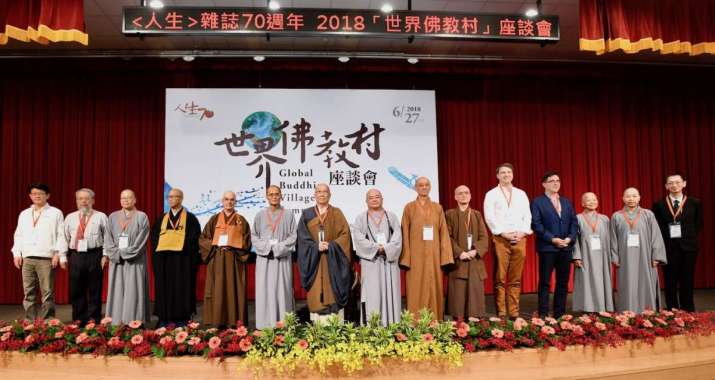
TAIPEI—Organizations affiliated with the Taiwan-based Dharma Drum Mountain international Chan Buddhist community on Wednesday hosted a far-reaching conference titled the Global Buddhist Village Symposium in Taipei. Inviting discussion on practicing the Dharma and developing Buddhist cultures in times of radical change, the forum featured talks and addresses by some of the foremost teachers, scholars, and experts in the international Buddhist community.
Organized by Humanity Magazine, Dharma Drum Publishing Corp., the Sheng Yen Education Foundation, and DDM Public Buddhist Education Center, the event also commemorated the upcoming 10th anniversary of the passing of the prominent Chan monk, teacher, and scholar Master Sheng Yen (22 January 1930–3 February 2009), and marked the 70th anniversary of the Buddhist periodical Humanity Magazine.
“We sincerely believe that the attendance and contribution of all of our guests will be beneficial to the exchanges of innovative ideas of the teaching and practicing Buddhism, and helpful in creating a bright future for Buddhists all over the world,” the organizers said in a statement.
Jakusho Kwong Roshi, founder of the Sonoma Mountain Zen Center in northern California, offered a keynote speech for the occasion. “I come from a very traditional background and it will be obvious to you that the traditional way—the way of the ancestors—is the true way,” the renowned octogenarian Soto Zen teacher shared with the assembly. “We talk about calm mind and we talk about a changing world. It reminds me that everything seems like it’s changing, but actually it’s just the same old thing related again and again and again. Isn’t it true? We’ve become seduced by the repetition and the entertainment and the preoccupation of a ‘changing world.’”
“But you know, there’s something that does not change . . .” Roshi continued, underlining the concept of non-duality. “What is it? This is really important: my teacher, Suzuki Roshi, said the Chinese Chan masters were the greatest. And there is a koan of two Chinese monks during their work period. One was very busily sweeping the floor, and another monk came by and said to him, ‘You’re so busy! You’re too busy!’ And the one who was sweeping said, ‘There’s one who’s not busy.’ And right away the other monk asked, ‘Did you know that there are two moons?’ And the sweeping monk help up his broom and cried, ‘Which moon is this?’”
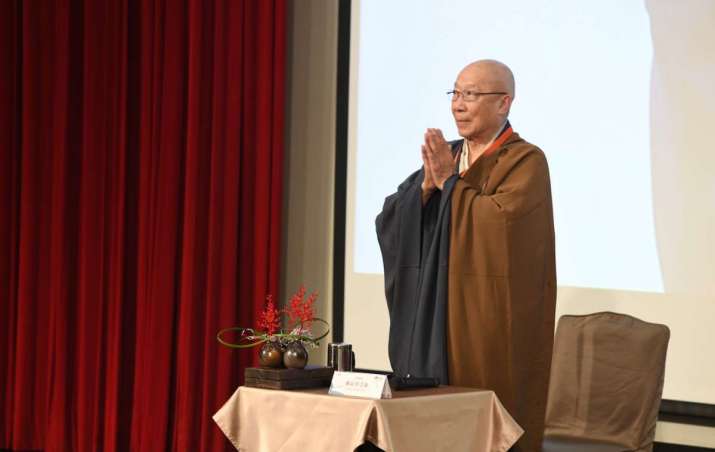
Speakers and dignitaries at the event included representatives of various monastic communities, among them Rev. Meian Elbert, abbess of Shasta Abbey, California, Ven. Phap Kham, executive director of the Plum Village Foundation Hong Kong, Ven. Chi Chern, abbot of Puzhao Buddhist Vihara in Malaysia, and Ven. Guo Huei, vice abbot president of Dharma Drum Mountain and dean of the Dharma Drum Institute of Liberal Arts, along with Daniel Aitken, CEO of Wisdom Publications, Sam Moew, director of audience development at Tricycle: The Buddhist Review, and Chien-huang Chen, director of the Centre for the Study of Humanistic Buddhism of Chinese University of Hong Kong.
Rev. Meian Elbert underscored the importance of the fourfold sangha in her address, observing: “I feel particularly that we need both lay trainees, male and female, and monastics, male and female, for the benefit of Buddhism. So a large part of what we do is training monastics, because if we don’t train them, who’s going do it?
“A large part of it is simply teaching the Buddhadharma; traditional Buddhist teachings of the Four Noble Truths, the Eightfold Path, the Three Characteristics—dukkha, anicca, anatta. Basic Buddhist teachings that I feel are still applicable in our modern day, even though things are different. But they’re not that different: the human heart is still the same; they’re still the same problems, really, in a different dress, it just seems more intense now. But I think that really it’s still the same old greed, hate, and delusion we’ve always had, and we just need to learn how to train with that, convert it—to learn to live together in this world.”
“It seems harder now because of the Internet; everybody is connected, everybody sees what everyone else is doing, for better or worse. There are wonderful things about the Internet, which means we can spread the Dharma, and yet it also means that people take a little bit of this and a little bit of that, and it can become diluted by our own views . . . it’s easy to pick and choose and to take what you want, yet miss the root, the fundamental teachings of the Buddha.”
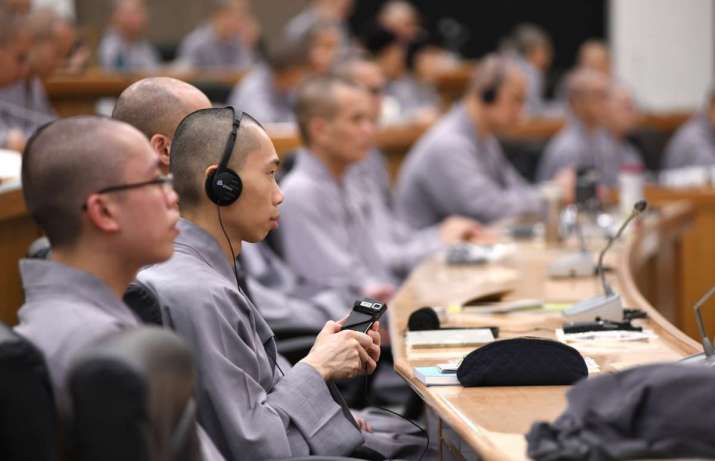
Dharma Drum Mountain is an international Buddhist foundation established in 1989 by Master Sheng Yen, focusing on spiritual, educational, and social engagement activities and headquartered in New Taipei City, Taiwan. The organization was founded on Master Shen Yen’s belief that: “The Dharma is so wonderful, yet so few people know about it, and so many people misunderstand it.”
There are now nearly 50 Chan centers affiliated with Dharma Drum Mountain in the US and other Western countries.
See more
Global Buddhist Village Symposium (Dharma Drum Publishing Corp.)
Dharma Drum Mountain
Sonoma Mountain Zen Center
Shasta Abbey Buddhist Monastery









